Sharat Pradhan in Lucknow
No sooner than the campaign for the recently concluded 2007 state assembly elections started in Uttar Pradesh, two sons rose up from rival camps -- Rahul Gandhi, referred widely by both friends and foes as Congress 'yuvaraj' and Samajwadi Party pointsman Akhilesh Yadav, who was now awaiting his coronation as the state's youngest ever chief minister. Sharat Pradhan reports.
Even though Congress as a party was not seen in Uttar Pradesh as any match to the Samajwadi Party, it soon became like a battle between the youth icons of the two parties.
Yet' the difference remained. While Rahul was the privileged inheritor of a huge dynasty that had ruled India for decades' Akhilesh remained the 'dharti putra' of 'dharti putra' Mulayam Singh Yadav' who had not only roughed it out through the mill to rule Uttar Pradesh three times.
Interestingly' Rahul's visit to homes of Dalits where he shared a meal or spent a night got tremendous publicity by not only the local media but also national and international media.
While he never cribbed about the 'yuvaraj' being the darling of the media, Akhilesh chose to give a one line subtle reply by declaring at one of his election rallies, "When I saw Rahul being repeatedly hailed for eating in Dalit homes, I just thought of inquiring about the caste of my cook who had been handling our kitchen for many years -- and to my surprise he turned out to be a Dalit."
Surely that was enough to silence Rahul who had gone saying how he could understand the pain and plight of the poor downtrodden simply because he had shared a meal with them.
After all, Akhilesh's remark clearly sent out the message that even though he had been routinely eating food cooked by a Dalit for years, he never cared to earn 'brownie points' out of it. On the other hand, it was a big deal for Rahul, who was out to take every political mileage out of the gesture.
...
People simply came to see the 'yuvraj'
Image: Rahul Gandhi during his UP tourRahul's efforts to bring the British High Commissioner David Milliband to spend a night in a Dalit's home in his parliamentary constituency Amethi, followed by a visit from Microsoft chief Bill Gates to some health care projects undertaken by Non-Governmental Organisation in certain villages of his constituency, which initially aroused some euphoria' were soon dismissed as "poverty tourism". Akhilesh did not have to tell anyone that he was the true son of the soil.
Rahul was also very vocal in emphasising, "Unless you have visited the home of a poor Dalit and shared a meal with him and drank the water he consumes, you cannot understand his pain and sufferings, because when you drink that water your stomach will get upset, which is when you would realise how a poor man survives in those conditions."
What the yuvaraj however failed to realise was the fact that he sounded very naive and immature.
As leading socialist and political analyst Pushpesh Pant puts it, "Those kind of remarks simply showed that this descendent of the Gandhi family had not even cared to read his own great-grandfather's famous autobiography --- The Discovery of India."
By making utterances like this, Rahul was going about further exposing himself as an alien on a visitor visa to the rural reality of India. Even though he pulled good crowds wherever he went, that was apparently more because of the curiosity of the people to see what the yuvaraj of the country's number one family looked like.
...
Akhilesh: The fellow next door
Image: Akhilesh Yadav smiles during a meeting with the newly elected legislators at SP headquarters in LucknowPhotographs: Reuters
This must have misled him to believe that the crowd which thronged around him was there to stay when it came to voting for him too. The fleeting visits failed to make the desired impact as he failed to connect with the masses, while Akhilesh was always recognised as the fellow next door.
Also what adversely affected Rahul was his late entry into the campaign. Even his efforts to mingle with the crowds and reach out to them began to be seen as "political gimmick" because there was no follow-up action by him to consolidate his visits.
His second visit to any place other than Amethi and Rae Bareli' came only at the time of the elections when he started doing the highly ill-advised "road-shows", which failed to get him anywhere. The road-shows turned out to be more like speedy ramp-walk through different cities without the least semblance of any kind of connect with the masses.
Rahul remained accessible only when he was out to play the "electoral gimmick" -- when he played the Dalit card, followed by the the farmer' s card when he sought to give the Bhatta Parsaul issue a huge hype, or by raising the pitch on wooing the Muslim vote -- that was clearly aimed solely at winning the election.
At all other times, he remained inaccessible to all and sundry' and also chose to keep the media at a distance, so whatever he did also remained invisible.
Akhilesh' on the other hand was not only affable but also approachable. Those who were on his campaign trail know how he invariably identified his partymen by their first names.
...
Akhilesh never took to 'aggression' politics
Image: Akhilesh at a campaign rallyPhotographs: Courtesy: The Samajwadi Party
Asked how he manages that, considering that the gigantic size of the party organisation in the state ' the young Yadav observed' "It is thanks to my father from whom I have inherited this habit; haven't you seen him addressing most party workers by name even at his age?"
Ever since the responsibility of the state organisation was entrusted upon him, Akhilesh made it a point to spend time in the party office on a daily basis to ensure his availability to every single party worker.
All of Rahul's talks about modernity and technology ended up in lip service, as he did not miss an opportunity to play up hackneyed issues such as caste which became blatantly visible when he sought to describe India's telecom revolution architect Sam Pitroda as a "carpenter by caste".
Akhilesh, on the other hand was not heard raising issues like case or creed. And when it came to his techno-friendly ways' he did not miss a single opportunity to put his tech-savvy skills to good use all through the election process, while entrusting the task of campaign publicity to serious professionals.
Significantly, Akhilesh never took to his father's politics of aggression and confrontation. Evidently, this brought him sharp contrast to Rahul whose anger and pitch went louder and whose tirade against political rivals turned sharper and even personal as the poll moved forward.
...
Rahul's and Akilesh's campaigns were contrasting
Image: Rahul Gandhi with mother Sonia Gandhi, the Congress presidentHowever, more than anything else that propelled Akhilesh as the "man of the match" was his stand against fielding of outlaws. Even as he could not completely insulate the party against criminals,he did succeed in sending a strong message' by giving a snub to dreaded mafia don D P Yadav' whose name spells terror in western UP and his son remains the key accused in the Nitish Katara murder case.
His success in the face of much opposition from uncle Shiv Pal Yadav and 'chacha' Azam Khan became a defining moment in his career as it spelt out two clear messages -- that he would henceforth call the shots in the party and that SP would have much lesser room from outlaws and criminals.
At the end of the day, that clearly paid unprecedented dividends in the form of a sweep at the election. In fact, it was once again their ego working against Aklhilesh' when they made attempts to thwart the junior Yadav's nomination to the top UP position. It was Mulayam's veto that eventually humbled them, while overwhelmed partymen hailed his succession.
Rahul however came and went in sharp contrast. Always surrounded by sycophants' there was none to tell him his weaknesses or shortcomings. Even when all his running across the length and breadth of the sprawling state fell flat on March 6, when the electronic voting machines unfolded their verdict, there was no dearth of senior Congressmen who were desperate to take all the blame for the party's rout.
Eventually, while the yuvaraj remained oblivious of ground reality and let the carpet slip from under his own feet, the 'dharti-putra' remained grounded and still kissed the skies.

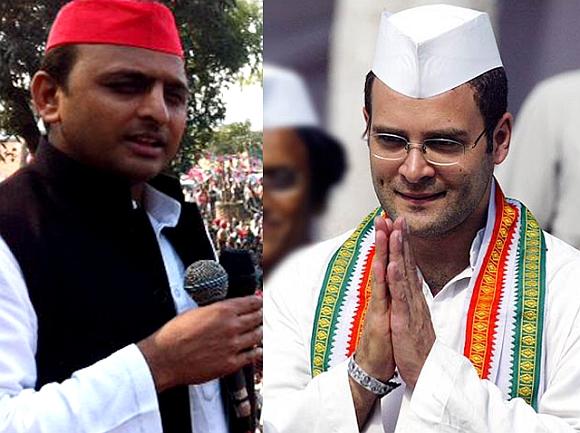
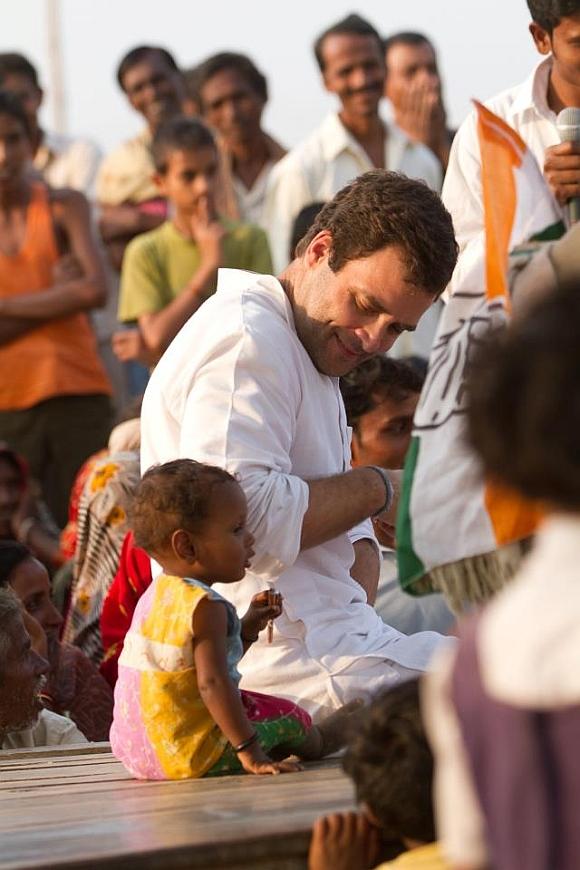
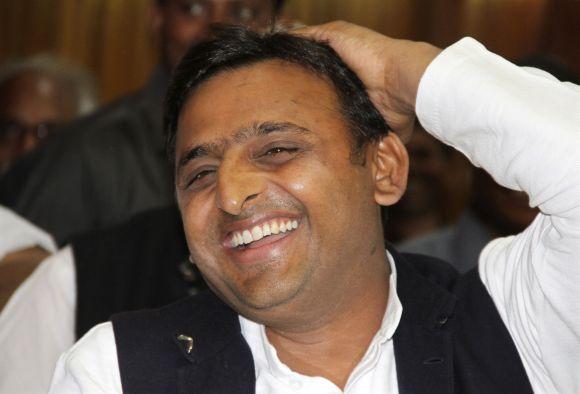
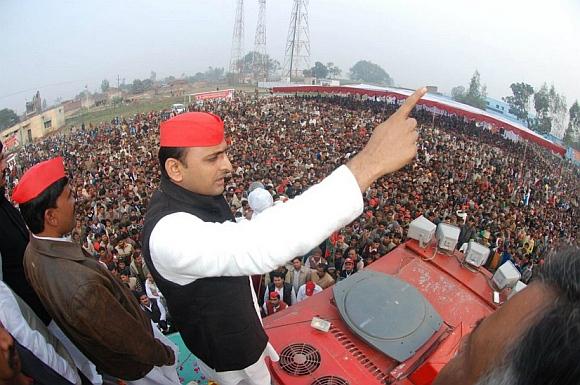
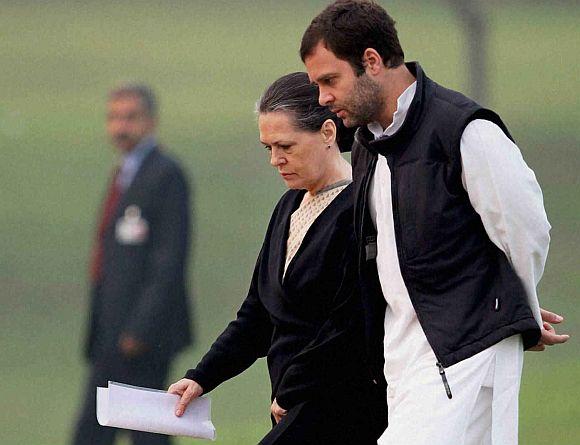
article